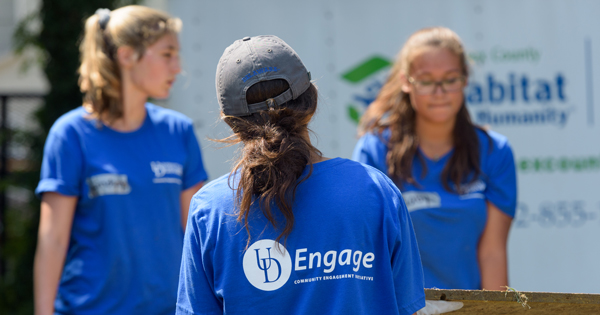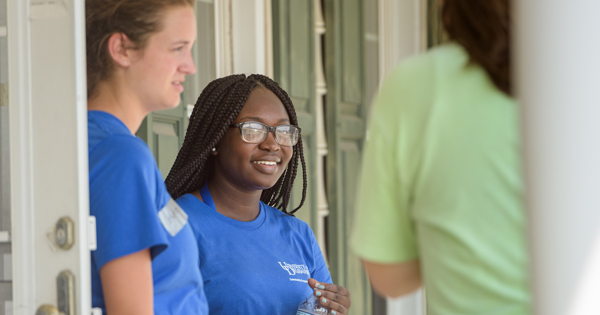


Service before the classroom
Photos by Evan Krape September 12, 2017
Community Engagement Scholars: Building homes, relationships, and a passion for service
Editor’s Note: Valerie Lane is the Coordinator for the Community Engagement Initiative in the Office of the Provost at the University of Delaware
When I arrived at the University of Delaware as a graduate student, I was so overwhelmed by the opportunities for learning, resources to explore, and people I was sure I would meet. It was both exciting and nerve-wracking, and I’m sure faculty, staff, students, and my fellow alumni would echo this experience. What I’ve learned since that day has been to embrace the nerves. Stepping out of your comfort zone, both in and out of the classroom, is where learning really happens.
Now, as a staff member at UD, I try to cultivate these learning experiences rooted in uneasiness wherever possible. This year, I helped 34 first-year students step out of their own comfort zone on a service trip that I hope will make an impact on their college careers. These students are UD’s inaugural class of Community Engagement Scholars, a new four-year affinity program that builds citizenship skills for students in all academic majors.
At 7 a.m. on the day before move-in weekend, we boarded a bus headed to Laurel, Del., ready for two days of service with Sussex County Habitat for Humanity. These sleepy-eyed students had made the conscious decision to begin their Blue Hen experience dedicated to community engagement.
Restoring Homes in Laurel, Del.
After arriving at our site in Laurel, the students immediately got to work. I watched as their passion for engagement overcame their nerves—they were ready to make progress.
The students broke into four teams and worked on three different houses. While many Habitat for Humanity builds are new construction, these students were working on restoring existing houses in order to maintain Laurel’s charm and architectural character. They ripped out flooring, cleaned up backyards, and carefully removed historic molding to be restored and re-installed in the house.
A sledgehammer rose into the air and came crashing down on the thick slabs of concrete, making cracks and eventually breaking apart a huge pile. The students then carried the broken pieces to the dumpster, each trip making the backyard a little cleaner, and a little closer to being called home. They cheered each other on as they conquered projects both large and small, working together as a team to help the community revitalize old properties into a space for new families to grow.
Learning in and out of the classroom
I wanted these students to learn the importance of listening and engaging with the community. Before this new group of students even entered the university classroom, I hoped they were thinking about how and why we partner with communities to bring about positive change. While classroom learning is essential to understanding techniques, skills, and strategies for community engagement and creating change, the learning cannot end there. By encouraging them to work in and with communities that are experiencing revitalization, it’s my hope that their lens on community engagement will consistently be with one foot in the classroom and one foot in the community. Summer immersion programs such as Cooperative Extension Scholars, Public Policy Fellows, and Service Learning Scholars offer this service-learning experience to upper-division students—and this trip offered service learning before classes were even in session.
On Friday, the students learned about Habitat from Humanity as an organization, the rural poverty affecting Sussex County, and how to restore homes for the benefit of the greater Laurel community.
On Saturday, we traveled thirty minutes east to Millsboro, where the students worked with homeowners to clean up yards, weed plant beds, and power wash siding and sidewalks. The clean-up efforts were part of a larger “Rock the Block” event with Sussex County Habitat for Humanity and the Sussex County Housing Consortium. While yard work may not seem like it affects the community, it serves as a catalyst for larger change, and affects the way people both in and outside the community view the neighborhood. By the end of the morning, every house on the block looked brand new, and you could tangibly feel the pride in both the students and residents.
Returning to Newark during move-in day, cultivated an excitement for both me and the students. All of their hard work over the two days made an impact not only in the community, but on the students’ lives as well. While that may seem vain to say, I’ve found it’s nearly impossible to have been immersed into a community, even for a brief time, and not walk away with some sort of lesson or change in yourself.
Watching the students get to know each other, begin a bond, reflect on their service, and work with Delawareans over two days was an amazing thing to witness, and will hopefully be the start of remarkable things for their group. To see the beginning of their college career was an experience I will never forget, and I can only imagine what we’ll all be thinking when they graduate in four short years.

Community Engagement Initiative
As a part of the Community Engagement Initiative, the Community Engagement Scholars is a four-year affinity program that builds citizenship skills for students in all academic majors. The first class of Community Engagement Scholars, part of the Class of 2021, began this 2017. They will take academic courses as a group, engage in service opportunities, and attend campus programs featuring speakers that discuss community and civic engagement. For more information about the Community Engagement Scholars program, visit the Community Engagement Initiative website: udel.edu/engage.
Contact Us
Have a UDaily story idea?
Contact us at ocm@udel.edu
Members of the press
Contact us at 302-831-NEWS or visit the Media Relations website

